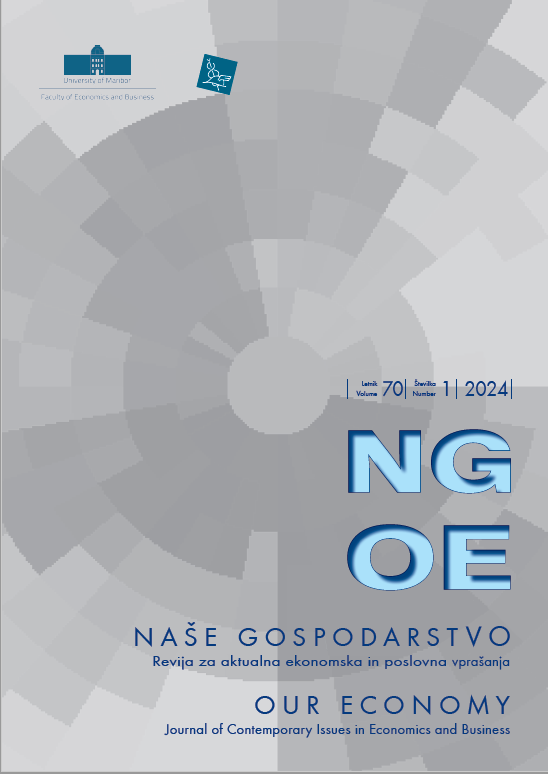Carbon Credits and Crude Oil: An Investigation of the Price Returns Interaction in the International Market
Keywords:
Carbon credit, Crude oil price, VECM model, Volatility modelAbstract
This paper aims to verify the relationship between the international markets for crude oil and carbon credits. We studied the returns of prices practiced in these markets, focusing on the transmission of shocks between oil prices and carbon credit prices. The methodological approach used financial econometrics to study these variables' risk and return relationships. Besides causality and cointegration hypothesis tests, the VECM and GARCH models were estimates. There is a shortand long-term interaction between these variables. The volatility models show a significant association between the volatilities of the two variables of interest. Fossil fuels, mainly crude oil, generate energy that has substantial restrictions. At the same time, the carbon credits market has shown significant growth that can contribute to the use of energy from fossil fuels with parsimony and responsibility. Studying these variables and their interactions contributes to understanding the importance of the carbon market.
Downloads
References
Benz, E. & Trück, S. (2009). Modeling the Price Dynamics of CO2 Emission Allowances. Energy Economics, 31 (1), 4-15. DOI: https://doi.org/10.1016/j.eneco.2008.07.003.
Bollerslev, T. (1986). Generalized Autoregressive Conditional Heteroscedasticity. Journal of Econometrics, 31, 307-327. DOI: https://doi.org/10.1016/0304-4076(86)90063-1
Bollerslev, T. (2008). Glossary to ARCH (GARCH). CREATES Research Papers 2008-49. Retrieved from https://ssrn.com/abstract=1263250. DOI: http://dx.doi.org/10.2139/ssrn. 1263250
Brooks, C. (2014). Introductory Econometrics for Finance, 3 Ed. University Printing House, Cambridge.
D’Ecclesia, R., Magrini, E., Montalbano, P. & Triulzi, U. (2014). Understanding Recent Oil Price Dynamics: A Novel Empirical Approach. Energy Economics, 46 (1), S11-S17. DOI: https://doi.org/10.1016/j.eneco.2014.10.005
Daskalakis, G, Psychoyios, D. & Markellos, R. (2009). Modeling CO2 Emission Allowances Prices and Derivatives: Evidence from the European Trading Scheme. Journal of Banking and Finance, 33, 1230-1241. DOI: https://doi.org/10.1016/j.jbankfin.2009.01.001
Dutta, A. (2018). Modeling and Forecasting the Volatility of Carbon Emission Market: The Role of Outliers, Time-Varying Jumps and Oil Price Risk. Journal Cleaner Production, 172, 20, 2773-2781. DOI: https://doi.org/10.1016/j.jclepro.2017.11.135
Enders, W. (2014). Applied Econometric Time Series, 4 Ed. John Wiley & Sons, Inc New York.
Engle, R. F. & Bollerslev, T. (1986). Modelling the Persistence of Conditional Variances. Econometric Reviews, 5, 1-50. DOI: https://doi.org/10.1080/07474938608800095
Engle, R. F. & Granger, C. W. (1987). Co-integration and Error Correction: Representation, Estimation and Testing. Econometrica, 55, 2, 251-276. DOI: https://doi.org/ 10.2307/1913236
Engle, R. F. (1982). Autoregressive Conditional Heteroscedasticity with Estimates of the Variance of United Kingdom Inflation. Econometrica, 50, 4, 987-1007. DOI: https://doi.org/10.2307/1912773
Feng, Z., Zou, L. & Wei, Y. (2011). Carbon price volatility: Evidence from EU ETS. Applied Energy, 88, 590-598. DOI: https://doi.org/10.1016/j.apenergy.2010.06.017
Granger, C. W. (1969). Investigating Causal Relations by Econometric Models and Cross-spectral Methods. Econometrica, 37, 3, 424-438. DOI: https://doi.org/10.2307/1912791
Guðbrandsdóttir, H.N. & Haraldsson, H. (2011). Predicting the Price of EU ETS Carbon Credits. Syst. Eng. Procedia, 1, 481–489. DOI: https://doi.org/10.1016/j.sepro.2011.08.070
Gujarati, D. & Porter, D. (2011). Basic Econometrics, 5 Ed. McGraw-Hill, New York.
Gujarati, D. (2019). Econometrics by Example, 2 Ed. Macmillan International Higher Education.
Johansen, S. & Juselius, K. (1990). Maximum Likelihood Estimation and Inference on Cointegration with Applications to Demand for Money. Oxford Bulletin of Economics and Statistics, 52, 169-210. DOI: https://doi.org/10.1111/j.1468- 0084.1990.mp52002003.x
Johansen, S. (1991). Estimation and Hypothesis Testing of Cointegration Vectors in Gaussian Vector Autoregressive Models. Econometrica, 59, 1551-1580. DOI: http://dx.doi.org/10.2307/2938278
Kanamura, T. (2021). Carbon Market Analysis and Risk Management. Handbook of Energy Economics and Policy. DOI: https://doi.org/10.1016/B978-0-12-814712-2.00007-5
Michaelowa, A., Shishlov, I. & Brescia, D. (2019). Evolution of International Carbon Markets: Lessons for the Paris Agreement. Wiley Interdisciplinary Reviews: Climate Change, 10(6),1-24. DOI: https://doi.org/10.1002/wcc.613
Nelson, D. (1991). Conditional Heteroskedasticity in Asset Returns: A New Approach. Econometrica, 59, 347-370. DOI: https://doi.org/10.2307/2938260
Paolella, M. & Taschini, L. (2008). An Econometric Analysis of Emission Trading Allowances. Journal of Banking and Finance,32, 2022-2032. DOI: https://doi.org/ 10.1016/j.jbankfin.2007.09.024
Salles, A. & Almeida, P. (2017). The Crude Oil Price Influence on the Brazilian Industrial Production. Open Journal of Business and Management, 5, 401-414. DOI: https://doi: 10.4236/ojbm.2017.52034.
Salles, A. & Campanati, A. M. (2019). The Relevance of Crude Oil Prices on Natural Gas Pricing Expectations: A Dynamic Model Based Empirical Study. International Journal of Energy Economics and Policy, 9(5), 322–330.
Salles, A., Silva, M. & Teles, P. (2022) Empirical Evidence of Associations and Similarities between the National Equity Markets Indexes and Crude Oil Prices in the International Market. Open Journal of Business and Management, 10, 155-174. DOI: https://doi: 10.4236/ojbm.2022.101010.
Salles, A., Novo, M. & Reis, N. (2021). Influence of Crude Oil Prices on Food Insecurity Problem: the Nexus of Crude Oil and Food Prices, In International Federation of Operational Research Societies - IFORS 2021, Programme Book.
Sims, C. A. (1980). Macroeconomics and Reality, Econometrica, 48(1), 1-48. Retrieved from https://www.jstor.org/stable/1912017
Tang, K. & Xiong, W. (2012). Index Investment and the Financialization of Commodities. Financial Analysts Journal, 68, 6, 54-74. DOI: https://doi.org/10.2469/faj.v68.n6.5
Tian, Y., Akimov, A., Roca, E. & Wong, V. (2016). Does the Carbon Market Help or Hurt the Stock Price of Electricity Companies? Further Evidence from the European Context. Journal of Cleaner Production, 112, Part 2, 1619-1626. DOI: https://doi.org/ 10.1016/j.jclepro.2015.07.028
Wooldridge, J. (2009). Introductory Econometrics: A Modern Approach, 4th Ed. Nelson Education, Mason. Ohio, USA: ThomsonSouth Western.
Downloads
Published
Issue
Section
License
Copyright (c) 2024 André Assis de Salles, Renato Barros Lima

This work is licensed under a Creative Commons Attribution-NonCommercial-NoDerivatives 4.0 International License.
